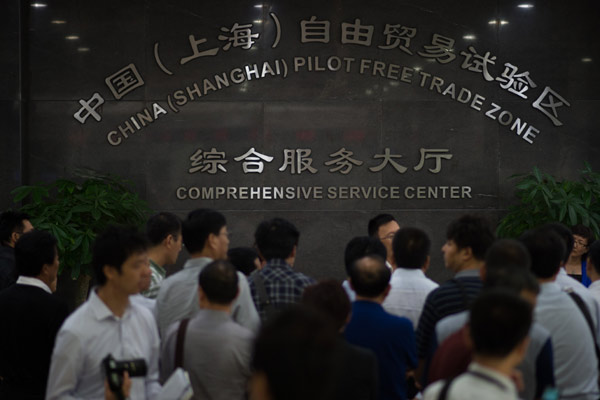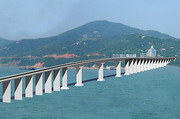Three new FTZs get nod
By Shi Jing in Shanghai and Qiu Quanlin in Guangdong ( China Daily )
Updated: 2014-12-27
|
|||||||||
 |
|
People wait at the comprehensive service center of the China (Shanghai) Pilot Free Trade Zone. Chinese law firms and their overseas counterparts will be allowed to cooperate on international legal cases in the zone. [Photo / AFP] |
Three new free trade zones will be established in China from March 1 next year, according to an announcement released on Friday during a regular meeting of the National People's Congress.
Based on the successful model used at the country's flagship China (Shanghai) Pilot Free Trade Zone over the past 15 months, new zones will now open in South China's Guangdong province, East China's Fujian province and North China's Tianjin Municipality, officials said.
The three will be roughly the same size, at around 116-119 square kilometers.
In addition, the State Council said the total area of Shanghai FTZ will be more than quadrupled in size from the current 28.78 sq km to 120.72 sq km, to include within its boundaries the advanced manufacturing-based Jinqiao Export Processing Zone, the high-tech hub Zhangjiang High - Tech Park and financial center Lujiazui, all of which are currently located in Shanghai's Pudong New Area.
Liu Gang, deputy director of the Binhai Development Research Institute of Nankai University, said the planned Tianjin FTZ "will accelerate the city's growth in two major sectors: the modern services industry and the manufacturing industry, and greatly help facilitate trade".
"This opening up will also help the city attract more creative resources," he said.
The Pingtan Comprehensive Pilot Zone in Fujian province, designated in 2009 as the only experimental zone on the Chinese mainland open to Taiwan, has enjoyed success in attracting investment from companies based on the island.
With that in mind, Lin Jiang, head of the public finance and taxation department of Sun Yat-sen University, said that as the State Council said it plans to ease investment rules for the three new planned zones, more policies should be introduced to the zone in Guangdong, for instance, to specifically attract interest from Hong Kong and Macao.
"As there are many Hong Kong and Macao-invested businesses in the Pearl River Delta, a policy to adopt the same commercial laws that are used in the two special administrative regions would help boost business", said Lin, and enhance cooperation between the city and its neighbors.
"The economy of Guangdong, a traditional manufacturing base in South China, will also be upgraded if the planned FTZ allows more modern service industries, particularly, to support trade and private businesses development," Lin said.
Commenting on the expansion of the Shanghai FTZ, Commerce Minister Gao Hucheng said the move would mean Pudong New Area could become a more solid base for incubating creativity.
Since the Shanghai FTZ was established in September last year, he said a number of new policies have been successfully tested there, including the "negative list" management of foreign investment, preferential trade and financial policies, as well as the opening up of more industries to foreign investors.
Max Ma, chief operating officer of the multinational human resources company FESCO Adecco, called the expansion "good news in general, but said they would like to have seen more substantial policies".
Zhang Min in Tianjin and Sun Li in Fujian contributed to this story.






